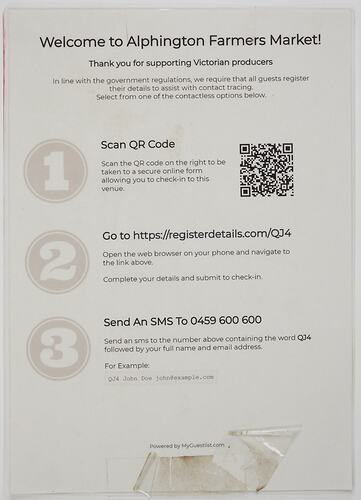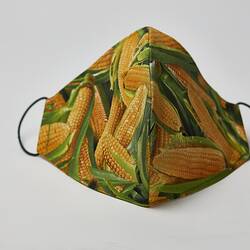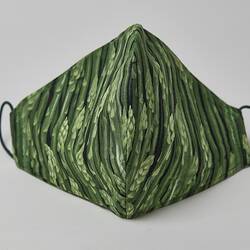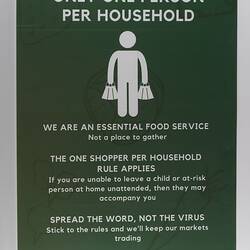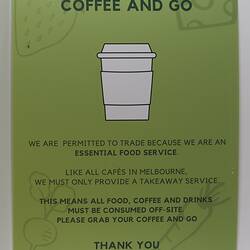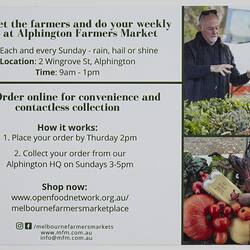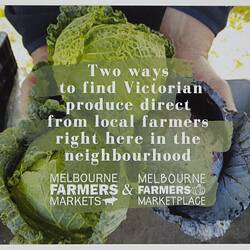Summary
Printed paper laminated sign used by Melbourne Farmers Markets during the COVID-19 pandemic in 2020. It was used at a seating area at Alphington Market.
After the second lockdown people were allowed to dine-in at venues, but had to register their contact details in case of coronavirus contact tracing. One of the easiest ways to do this was via scanning QR codes on a smart phone.
This sign was used at Alphington Market at a seated area and was fixed to every table for contactless registration. There is an option to use the QR code, go directly to a website or send an SMS.
Physical Description
Laminated beige coloured paper with black inscription and grey numbers. There is a QR code to the right of the page. There is adhesive tape on the bottom of the page and traces of red ink (texta?) along the top left hand edge.
Significance
With support from the Office for Suburban Development, this sign is part of a wider collection of objects and photographs relating to the Melbourne Farmers Markets that were acquired into Museums Victoria's State Collection in early 2021. These items - including social distancing signage, vegetable-themed face masks and digital photographs - provide lasting documentation of the role of the Melbourne Farmers Markets in providing food and produce to Melburnians during the coronavirus (COVID-19) pandemic in the months of 2020-early 2021.
Food security and having access to fresh food became a key concern of many Victorians during the emergence of the pandemic. Fears about the fragility of international and domestic food supply chains - coupled with the announcement of lockdowns and 'Stay at Home' restrictions - led many consumers to rush to supermarkets and shops to fill their cupboards. Panic buying, where shelves were stripped bare of produce, became one of the earliest and most potent symbols of the public fear response to the pandemic. While supermarkets struggled to cope with the increased consumer demand, the Melbourne Farmers Markets provided an alternative way for consumers to access produce directly from local farmers and in doing so, support local and small-scale farming businesses through a period of lockdowns and uncertainty.
Prior to the COVID-19 pandemic and since its' establishment in 2002, the Melbourne Farmers Markets had long been committed to supporting small-scale Victorian farmers, vegetable growers, orchardists, apiarists and other producers, with a strong focus on strengthening relationships between the consumer and the producer. This ethos of supporting farmers and strengthening consumer/producer relationships became increasingly important during the COVID-19 pandemic, particularly due to the fact that many farmers had been substantially impacted by COVID-19 lockdowns and restrictions, with some losing the majority of their hospitality trade overnight and being faced with the issue of excess crops.
At the time the pandemic reached the State of Victoria, in early 2020, the Melbourne Farmers Markets Association were operating seven markets across the Melbourne region: Abbotsford, Alphington, Carlton, Collingwood, Coburg, Gasworks and the University of Melbourne. Four of these markets closed down during the pandemic, but three continued to operate and remained open as an 'essential service' throughout lockdowns. Adapting the markets to be 'Covid safe' was a challenge for both staff and customers; hand sanitisation, density controls, 1.5m queueing, cashless payments, discouraging social interactions and maintaining strict social distancing were some of the measures put in place to be able to meet the Victorian Government and DHHS requirements. Through these challenges and adaptations, the Melbourne Farmers Markets continued to provide an important meeting place where consumers could come together to purchase fresh produce and have a direct connection with the farmers that were producing their food.
This collection of Melbourne Farmers Market items providing lasting documentation of how the Melbourne Farmers Markets Association - including its' 150 Victorian farmers - adapted to the challenges of COVID-19 and pivoted their markets to operate in line with social distancing measures. They highlight a range of storylines and themes including; food security, food supply chains, small-scale farming, local food movements, emergency food relief, the impact of lockdowns on hospitality and agriculture industries and the various ways that producers and consumers adapted to the challenges of COVID-19. It also provides an important example of place-based community activity, where local communities were able to come together outdoors, in their local neighbourhoods, during a time of lockdown and social isolation.
More Information
-
Collection Names
-
Collecting Areas
-
Inscriptions
Welcome to Alphington Farmers Market! / Thank you for supporting Victorian producers / [Extensive Text]
-
Classification
-
Category
-
Discipline
-
Type of item
-
Object Measurements
217 mm (Width), 1 mm (Depth), 303 mm (Height)
-
Keywords
Agriculture & Farming, Commerce, Retailing, Farmers, Shopping, Signage, Food & Drink Consumption, COVID-19 Pandemic, Pandemics, Food, Markets, Sustainable Agriculture
